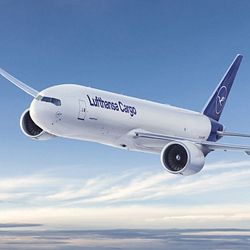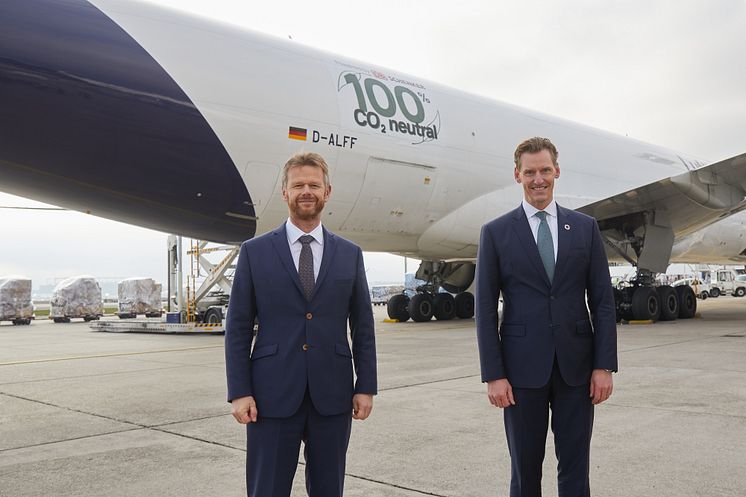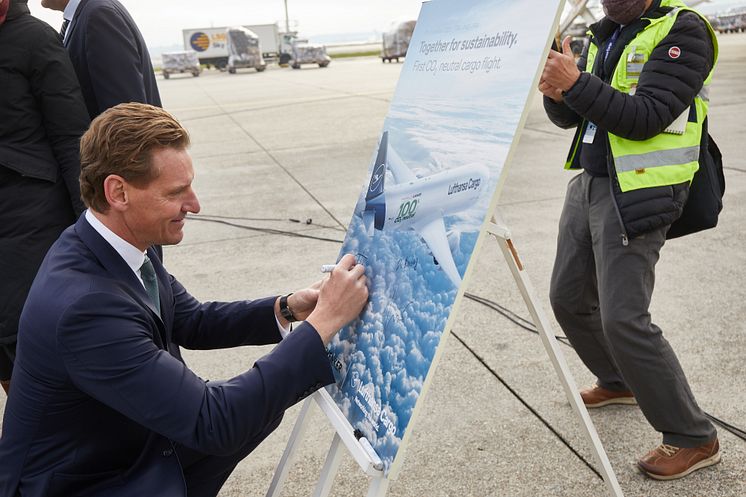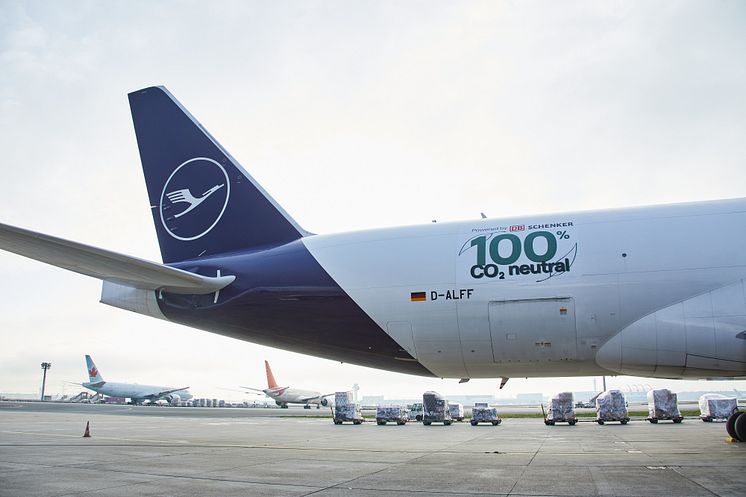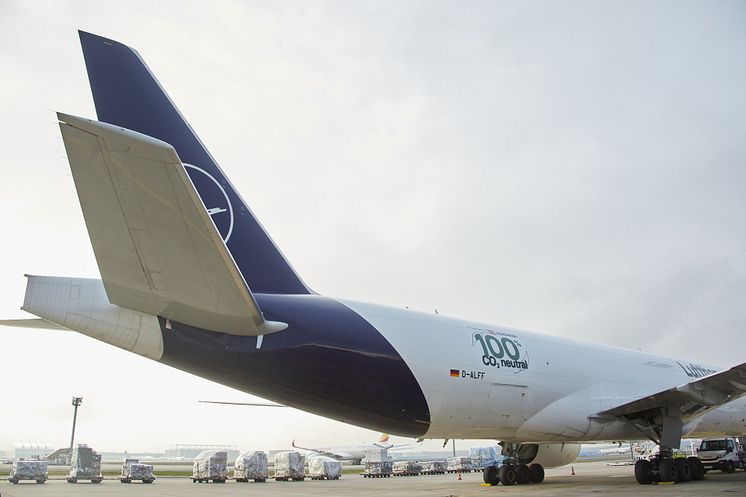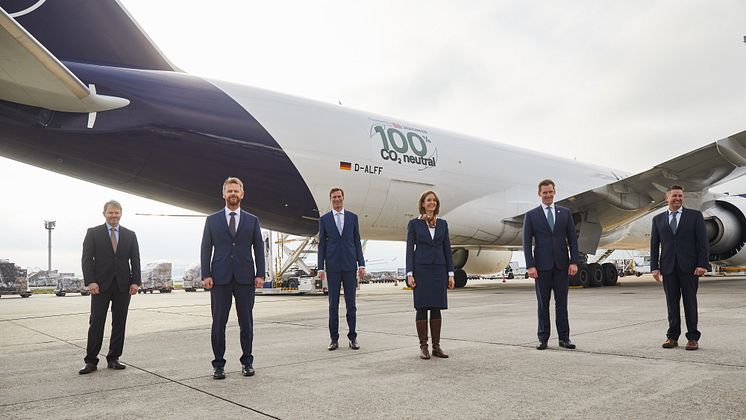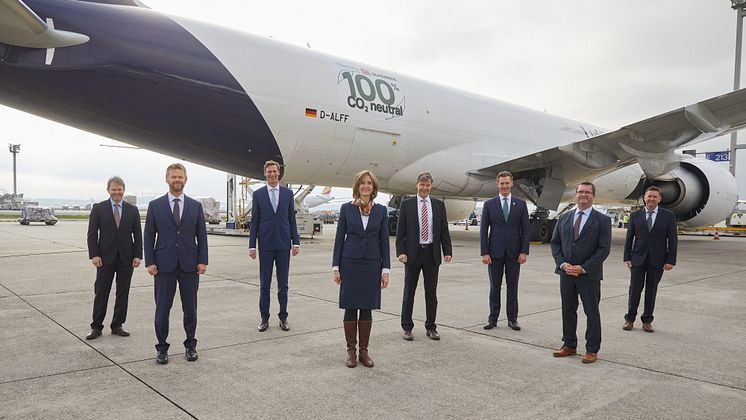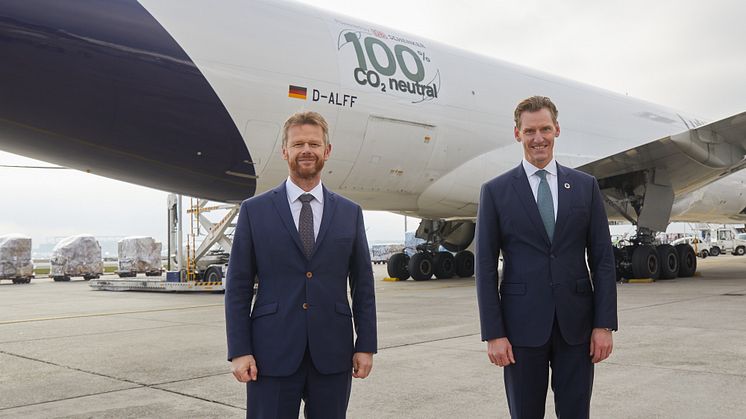
Press release -
Together for climate protection: Lufthansa Cargo and DB Schenker start first CO2-neutral freight flights
Commercial flight from Frankfurt to Shanghai and back • Complete coverage by Sustainable Aviation Fuel • Regular CO2-neutral air freight as of springtime
Frankfurt/Essen, 27 November 2020 - Coming Sunday, 29 November 2020, a cargo flight will take off for the first time in commercial aviation, whose fuel requirements will be completely covered by Sustainable Aviation Fuel (SAF). Lufthansa Cargo's Boeing 777F will take off from Frankfurt to Shanghai at 8:10 a.m. local time under flight number LH8406 and then returns to the Hessian metropolis. This first CO2-neutral freight flight is made possible by a cooperation between DB Schenker and Lufthansa Cargo. The logistics service provider and the air freight company will transport goods from Siemens Healthineers AG, among others, on this flight. DB Schenker and Lufthansa Cargo are committed to sustainable air transport and agreed in November 2020 to exchange views on environmental issues and to jointly promote them - including the move away from fossil fuels in air freight transport.
Minister of Transport and Digital Infrastructure Scheuer: "Even in the most severe crisis that has ever hit aviation, Lufthansa Cargo and DB Schenker are facing up to their responsibility for climate protection and are operating their first freight flight from Frankfurt to Shanghai entirely with sustainable alternative fuel. This is an important signal right now that the companies are looking to the future despite all the concerns and are taking important steps to make aviation more sustainable."
"With this flight we are committed to the increased research and use of SAF so that sufficient quantities of the alternative fuel will be available in the future. In addition to investments in a modern freighter fleet, our commitment to this CO2-neutral flight also contributes to the United Nations' 'Climate Action' sustainability goal. Because Lufthansa Cargo takes its corporate responsibility very seriously and is actively taking measures to meet this responsibility and relieve the environment," explained Peter Gerber, CEO of Lufthansa Cargo.
"We are already further ahead than many think when it comes to climate protection in air freight. We can demonstrate this with the first CO2-neutral freight flight in history," says Jochen Thewes, CEO of DB Schenker. "With the start of the 2021 summer flight schedule, DB Schenker will offer greenhouse gas-neutral air freight as a regular product. As a logistics provider, DB Schenker is the link between the loading industry and the airlines in order to actually implement climate protection in air freight. I am convinced that there is a great demand for this type of green transport and I am looking forward to seeing who will follow suit," continues Jochen Thewes.
"Getting our medical technology systems and important spare parts to where they are urgently needed and always being a reliable partner for our customers and their patients is our top priority. We are therefore all the more pleased that our logistics partners are sending an important signal and want to make air freight transport more climate-friendly in future. This is an important step towards sustainable transport routes," says Dr. Frank Debus, Head of Customer Services Managed Logistics at Siemens Healthineers.
Sustainable Aviation Fuel (SAF) refers to sustainable, synthetic kerosene. It is currently produced mainly from biomass, for example from sustainable or recyclable vegetable and cooking oils. In future, non-plant-based renewable fuels will also be available. The best-known production process for this is the so-called power-to-liquid concept (PtL) based on renewable electricity, water and CO2.
By using SAF, the fossil CO2 emissions of a flight with conventional kerosene are completely avoided. During combustion in the engine, only CO2 is released that was previously removed from the atmosphere, for example during plant growth. SAF is thus the first real alternative to fossil aviation fuel and the key to climate-friendly, CO2-neutral air traffic.
In addition, DB Schenker and Lufthansa Cargo are also using a reforestation project to compensate for the CO2 emissions and other greenhouse gases that result from the production of the biomass, processing and transport of the SAF. This ensures that the flights are completely greenhouse gas neutral overall.
The SAF used can be added to conventional kerosene as a so-called drop-in fuel and is therefore practical and suitable for everyday use without the need for adjustments to the aircraft and the supply logistics chain. For this reason, a quantity of SAF corresponding to the fuel requirements for the flights from Frankfurt to Shanghai and back is fed into the refuelling system at Frankfurt Airport. Each aircraft subsequently refuelled from the fuel depot receives and physically consumes a small amount of SAF. However, the CO2 avoidance achieved in this way is credited in full to Lufthansa Cargo and DB Schenker.
This is the first step in a joint effort agreed in November to move away from fossil fuels in aviation. The aim of the cooperation is, among other things, the regular exchange of information, the promotion of environmentally friendly technologies such as SAF. DB Schenker and Lufthansa Cargo combine the start of their first CO2-neutral flights with a call to shippers, logistics providers, airfreight carriers and also politicians to work together on expanding production and infrastructure and thus improving the availability of sustainable aviation fuel. Both companies are leading the way and will regularly offer CO2-neutral air freight as a product for the shipping industry from the summer flight schedule onwards.
Topics
Categories
Lufthansa Cargo AG
With a turnover of 2.5 billion euros and 8.9 billion revenue tonne-kilometres in 2019, Lufthansa Cargo is one of the world's leading companies in the transport of air freight. The company currently employs about 4,500 people worldwide. Lufthansa Cargo focuses on the airport-to-airport business. The cargo carrier serves around 300 destinations in more than 100 countries with its own fleet of freighters, the belly capacities of passenger aircraft operated by Lufthansa German Airlines, Austrian Airlines, Brussels Airlines, Eurowings and SunExpress, and an extensive road feeder service network. The bulk of the cargo business is routed through Frankfurt Airport. Lufthansa Cargo is a wholly owned Lufthansa subsidiary of Deutsche Lufthansa AG and Lufthansa Group’s logistics specialist.
Lufthansa Group takes responsibility
The Lufthansa Group has been committed to a sustainable and responsible corporate policy for decades and takes its responsibility seriously. The Group is firmly committed to climate-friendly aviation, continues to invest in particularly fuel-efficient aircraft despite the current exceptional situation and is expanding its commitment to Sustainable Aviation Fuel - Lufthansa Group takes responsibility.
About DB Schenker


